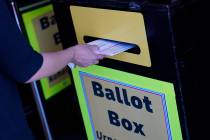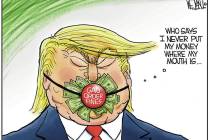‘They are generally not working’
According to the Centers for Disease Control and Prevention, obesity rates among 6- to 11-year-olds have quintupled since the 1970s. For children between 2 and 5, the rate has tripled. As if being teased by their peers isn't punishment enough, fat kids have a substantially increased risk of suffering from diabetes, high blood pressure and orthopedic problems. Those ailments can lead to a lifetime of costly medical bills.
This year, the federal government will spend more than $1 billion on nutrition education, fresh vegetable snacks, videos and lesson plans that emphasize to schoolchildren the importance of eating right. At the state and local levels, the sentiment is similar: If we can just throw enough money behind these programs, kids will start making the choices we want them to make.
An Associated Press report pops that balloon. The news agency reviewed dozens of studies on the effectiveness of all sorts of nutrition education efforts and found that almost none of them work. Which means the more than $1 billion appropriated by Congress to prop up these programs will be as effective in curtailing childhood obesity as buying a jumbo soda, french fries and fried chicken for every kid in America. Among The AP's findings:
-- One pilot program offered schoolchildren free fruit and vegetables at lunch, but fifth-graders not only rejected the option, they were less likely to eat the produce than before it was offered.
-- In Pennsylvania, researches resorted to bribing kids with prizes to make them eat fruit and vegetables. As soon as the prizes went away, children went back to their junk food.
"Any person looking at the published literature about these programs would have to conclude that they are generally not working," says Dr. Tom Baranowski, a pediatrics professor at Baylor College of Medicine.
Frustrated busybodies chalk up these failures to a number of scapegoats, including television advertisements for candy, soda, sugary cereal and fast food. They complain that school nutrition lessons can't compete with junk food propaganda broadcast during cartoons. A Kaiser Family Foundation study found that kids between the ages of 8 and 12 see an average of 21 TV ads each day for these kinds of food products.
What tends to get lost in that argument, however, is just how much TV kids have to watch to be exposed to that many commercials. If kids are spending four hours per day in front of the tube and no time exercising, cartoons could be advertising organic baby spinach leaves and youngsters would still get fat.
Top-down bureaucracies will never come to terms with the fact that this health issue, like most others, results from free choice and parental decisions. No amount of tax money will stop some parents from putting too-generous portions of unhealthful foods in front of their kids. No video of rapping, dancing asparagus will convince a typical 8-year-old that the green stuff tastes better than a candy bar. And even a doctor's order to get more exercise won't peel some kids away from their PlayStation consoles.
These realities, coupled with the failure of current federal programs, aren't likely to spur calls for the abandonment of expensive anti-obesity programs. If anything, they'll make bureaucrats more likely to lobby for a heavy-handed approach to the problem.
What kinds of laws might be proposed in the decades ahead? Will "facilitating obesity" one day be deemed a form of child abuse? Will convenience store clerks have to demand photo identification before allowing the purchase of ... candy bars and soda pop?
Make no mistake, the Nanny State's addiction to intrusiveness is building a movement to punish parents for their own choices and the free decisions of their children. And like an expanding waistline, it hasn't yet approached its limit.























